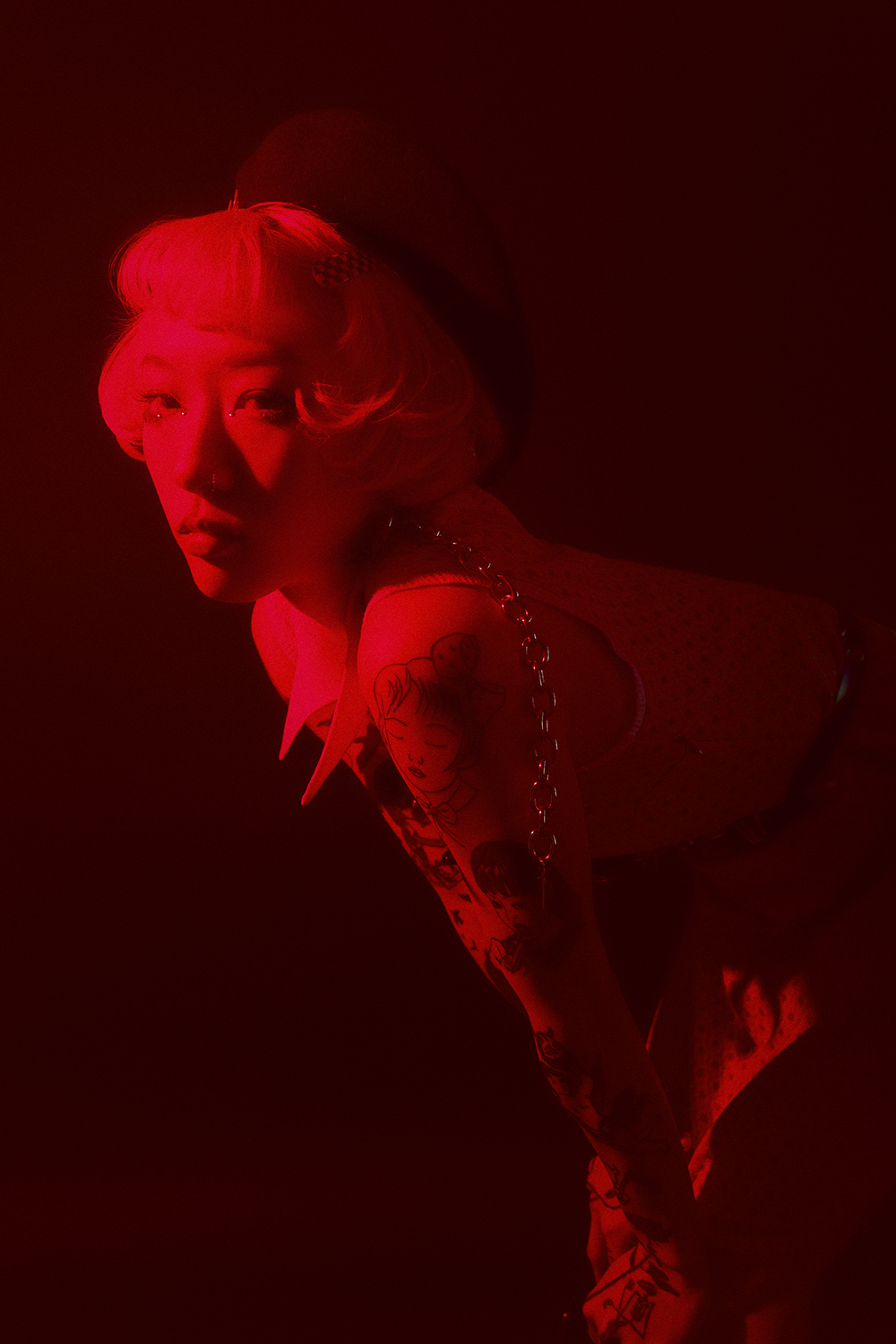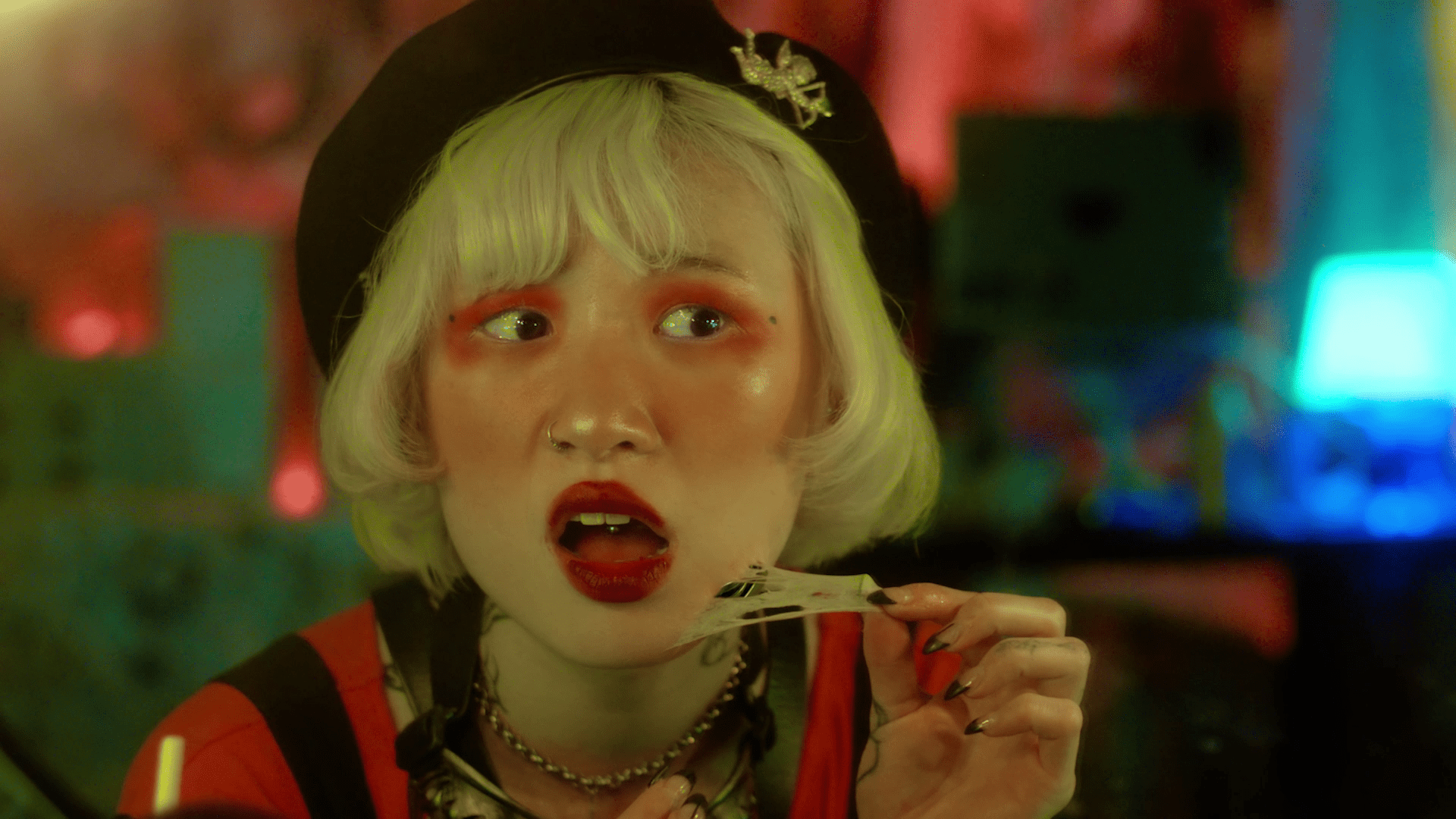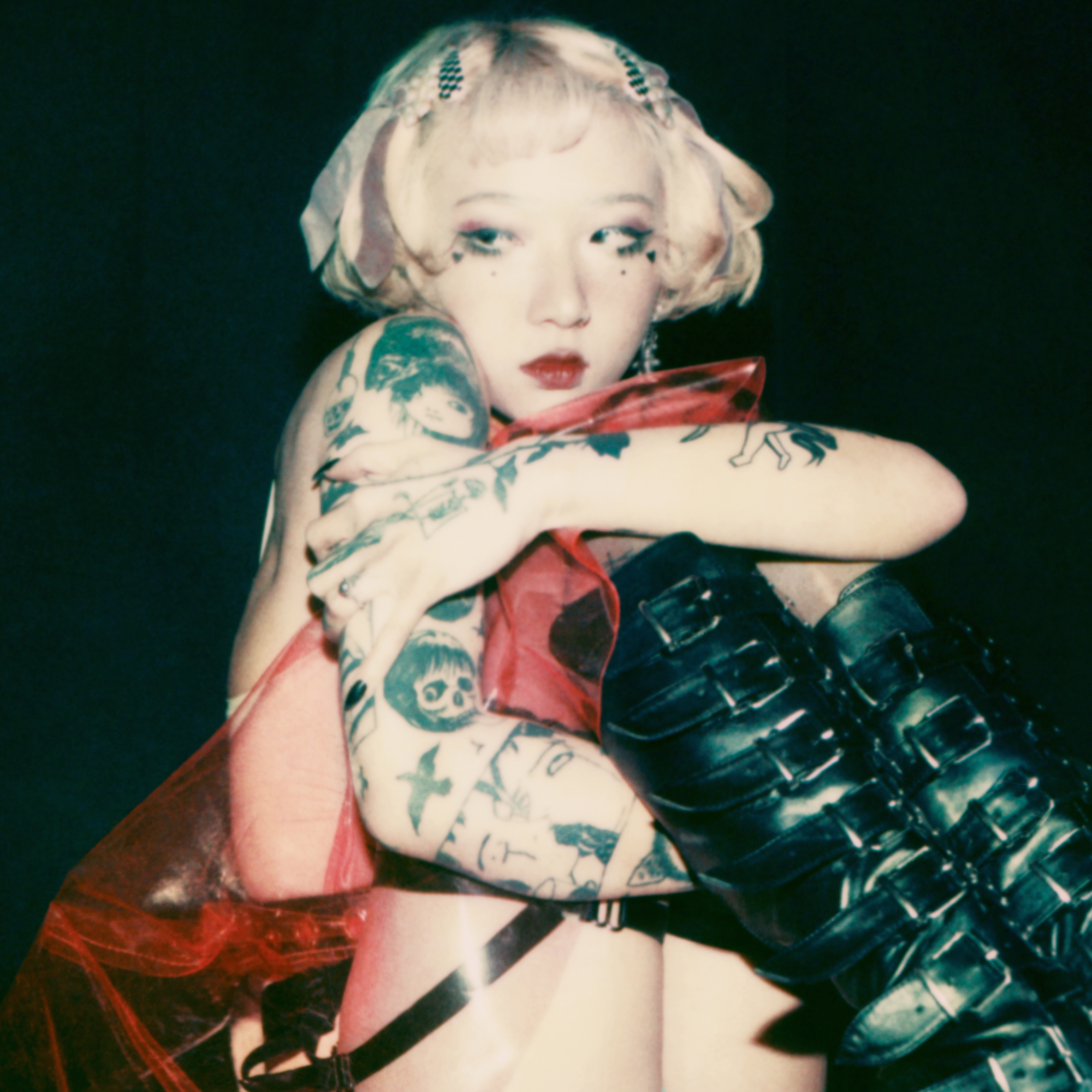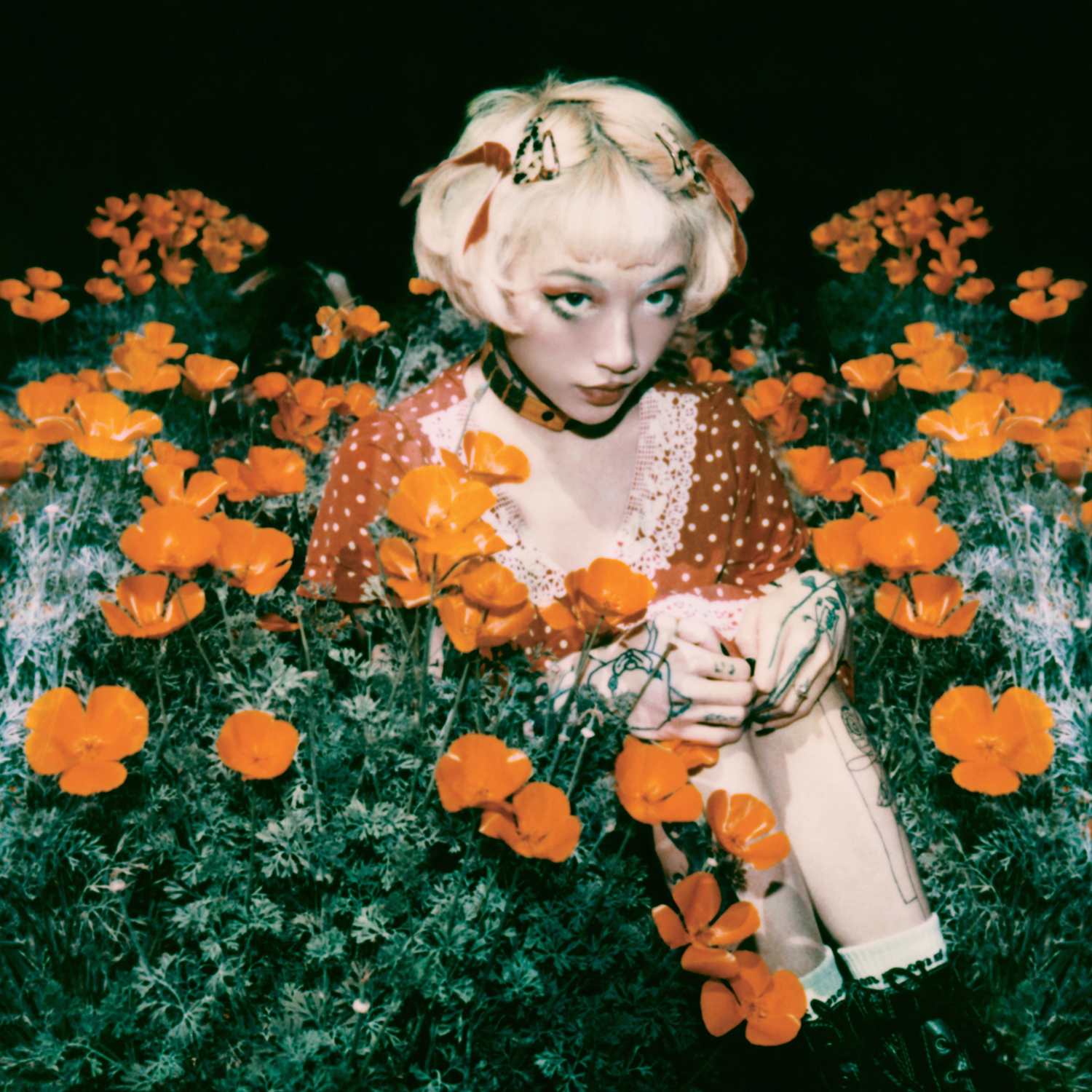As an artist, yeule has created and destroyed a lot of personas. For a time she was a goth manga warrior with long black hair, then a green-haired androgynous art angel, and a flame-haired punk princess. But with the release of her debut album Serotonin II today via Bayonet Records, yeule (real name Nat Ćmiel) has found a concrete visual representation of herself.
“There was a period where I was literally like a chameleon. Every time I met a friend who I haven’t seen in two weeks, I’d have different colored hair and a different style and I’d just look completely different. Or when I’d go back home to Singapore to visit my family, they’d be like woah, what the fuck!” Ćmiel says, laughing on the phone from London, where she’s lived for the last four years. “With this album, I think I latched onto this particular look for yeule that’s more solidified, because of my own realizations about self-discovery and expression. It’s good to have some grounding.”
That grounding comes via a look that’s a softer, more romantic rendering of her typical gothic style. She’s still chameleonic, but the bruised, demonic makeup contouring her face is alternated with more muted tones. This sartorial evolution coincides with a development in her music. Serotonin II finds Ćmiel’s celestial electronica, shoegaze, and dream pop more crystallized.
After three EPs and many years, she’s expanded her heavenly video game-influenced sound to cinematic proportions. As if going from dial-up to high-speed internet, her pop melodies develop more quickly and strike with more immediacy. The tender songs on Serotonin II call to mind The Postal Service and My Bloody Valentine but also sound like the musings of a benevolent creature that’s just landed from another galaxy. Just like her evolving visual style, Ćmiel’s new songs are breathtakingly beautiful, but any overtly delicate moments are shattered by sudden glitches or distortion.

Ćmiel’s complex sound and style derives from growing up on the internet. The name yeule is inspired by the Final Fantasy XIII-2 character Paddra Nsu-Yeul, who is “burdened with the power of prophecy” and dies every time she has a vision of the future. “A lot of my interests come from identity and recognition of the self, because of cyberspace and how it affects youth, particularly Generation Z,” she says. Having grown up as an avid gamer and isolated music fan in Singapore, Ćmiel found solace in creating and recreating herself via the internet. This allowed her to form her identity and gave her the courage to create her art. But despite the growth it’s afforded her, Ćmiel is wary of the internet and how we use it to shape our identities.
“When you use the internet as a form of escapism or glorify the internet [as a place] where you can truly be yourself, you’re creating this kind of self-fulfilling vortex of another reality. This was the case for me, in high school, because I didn’t have many friends. All of my friends were online, and I felt like I had true friends online, especially in gaming. When you build a team and you have a group that you come to online, it’s like a family,” she says.
“I put the internet on a pedestal, because it was my only form of escape. Growing up and out of teenage years, I was really confused when I started to have real friends and found the beauty in connecting with others in real life. I only realized how much it matters when I experienced it IRL. So now I’m at this point where I’m kind of detaching myself from the internet, because I want to feel real. Even though I felt real on the internet, I want to feel real without it.”
We often talk about how we deceive others online, but self-deception is equally present and problematic. As Ćmiel has built her personas, she’s had to remain aware of this, and keep one foot in the physical world. “It’s kind of like breaking an addiction!” she laughs. “I sound crazy, but it’s like breaking an addiction to a desire for a safe space, or what you thought was a safe space, you know?”

Fortunately, she’s recently found herself in a physical safe space as part of a community of electronic artists. Last week she travelled to Los Angeles to perform at 100% ElectroniCON 2, a festival organized by vaporwave futurist George Clanton. “I think that what George Clanton is doing is pretty OG,” she says, “considering the rise of a musical subculture like vaporwave, stemming from the internet and meme culture as well, and manifesting it in reality. It takes a lot of strength and I think that’s really sick.”
The festival is gaining traction as a positive incarnation of a scene that exists largely online, which feels like a rare blessing, given how much deception is rife on the internet. Yeule’s most recent single, “Poison Arrow,” also explores deception, albeit in a different scenario. In the video, which was shot in Warsaw, Ćmiel embodies a cupid character who suffocates an angelic boy with unrequited desire. It’s a reminder how, just as we can deceive ourselves by constructing alternate realities and personas online, we can also deceive ourselves in love and romance.
Ćmiel based her character in the video on one of her personas, called Penelope. “I asked Toby [Buchan, the director], ‘Is it weird that I have this other persona, and when I am Penelope I behave and act differently?’” She says Penelope’s “psychotic” nature made her an ideal choice for “representing this idea of the poison arrow.” “You don’t know whether she shot the right love arrow, or whether she shot another arrow that was meant for another purpose, or for someone else,” she says. “I’ve always questioned this idea — am I really giving my purest love to somebody, or am I accidentally poisoning them by giving them too much of what I think is love?”

Exploring ideas like this through her personas has afforded Ćmiel some distance with which to process her own painful encounters. “I’m not saying that online love is bad,” she says, “But to be with somebody online and never meet them in real life — that’s something different. And I’ve personally experienced that before. I think it becomes really confusing when the other person treats it as an online relationship, and you treat it as a real one. You question your self-worth, your trust, your idea of loyalty — you question a lot of things.”
The positive in all of this is that, as Ćmiel has solidified her own identity via the internet, she’s also gained a supportive community around her that extends into the real world. At her record release show in London on November 1, she plans to give away friendship bracelets with her album. “So if you get the vinyl, you get a friendship bracelet, and I have one too, so we’ll all be friends.”
Yeule’s album Serotonin II is out now via Bayonet Records
